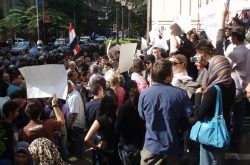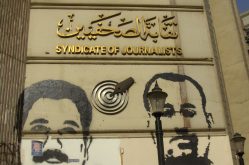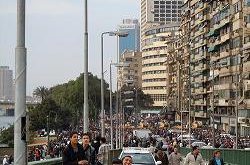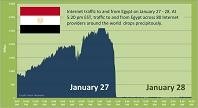Using video of a sexual assault in Tahrir Square as a case study, Madeleine Bair discusses the ethical and logistical considerations of citizen video as a means for social documentation. Bair points to the emergent challenges including reliability, consent, preservation and security, as citizen videos are sourced with increasing regularity by both new and traditional media. The Egyptian video, which sparked national change and international outrage, is a striking example of how citizen video can both shine light on an issue and stir controversy.
Read More »Egypt
Three Years Since the Spring: Special Print Edition Now Available
The Arab uprisings of 2011 triggered a wave of discourse on media and social movements. As interest grew, so did questions about the scope and impact of media, particularly new media, on the events that unfolded. In the three years since the upheaval began, AMS has been home to robust analysis of events from across the region. In the pages of this special print edition you will find a selection of articles primarily from our archives. For more information, including how to acquire a copy, please click the title link.
Read More »A Revolutionary Role or a Remnant of the Past? The Future of the Egyptian Journalist Syndicate after the January 25th Revolution
Miriam Berger reports on change and stagnation at the Egyptian Journalist Syndicate, Egypt’s only official journalist union. Through interviews with syndicate members and media observers, she paints a granular picture of how efforts to reform the syndicate remain blocked by entrenched political, economic and state interests.
Read More »Report: The American University in Cairo’s Conference on Egypt and International Models of Regulation and Accountability
Egypt’s broadcast media is widely seen as unruly and in need of regulation, with the rights and responsibilities of journalists still unclear two years after the revolution. Mark Visonà reports on the recommendations of a recent conference, hosted by the American University of Cairo, on how to build a regulatory framework. The conference, “Egypt and International Models of Broadcast Regulation and Accountability,” featured guest speakers from the United Kingdom, Germany, France, the United States, Tunisia, Libya, and Morocco.
Read More »Revolutionary Media on a Budget: Facebook-only Social Journalism
In one of the first studies of Egypt’s Rassd News Network (RNN), Yomna Elsayed explores how this Facebook-based citizen journalism network became the most influential news source during the revolution. Placing RNN in the context of alternative media launched on social networks, she explores the reasons for its success as well as the challenges that it faces.
Read More »Is the Egyptian Press Ready for Democracy? Evaluating Newspaper Coverage as an Indicator of Democratization
Noah Rayman performs a quantitative textual analysis of pre- and post-revolution news coverage in the Egyptian independent newspaper Al-Masry Al-Youm. He finds that the extent of the paper’s post-revolutionary political coverage and social engagement indicate that Egyptian society and media is progressing on the path to democratization, despite the fact that qualitative analysis paints a less optimistic picture.
Read More »A Proposal for a Dialogue on Media Reform
Muslim Brotherhood spokesman Mahmoud Ghozlan calls for a society-wide dialogue to discuss the reform of both state and privately owned media, including a ban on individuals owning more than 10 percent of a media outlet.
Read More »Egypt’s Media Ecology in a Time of Revolution
Dr Mark Allen Peterson contrasts the Egyptian mediascape in 2011 with its Iranian counterpart in 1979 and concludes that, unlike Iran, Egypt is unlikely to revert to a pre-revolutionary status quo which included state domination of the media.
Read More »Assessing the economic impact of the Egyptian uprising
Courtney C. Radsch discusses the interplay between the economic benefits of good communications, the willingness of Arab regimes to close down the Internet and mobile phone networks when they think their survival is at stake, and the role of multinational companies in the region.
Read More »Cyberactivism in the Egyptian Revolution: How Civic Engagement and Citizen Journalism Tilted the Balance
Dr Sahar Khamis and Katherine Vaughn give a comprehensive overview of the role of new media in the overthrow of Mubarak and wonders whether the same tools will enable activists to keep up the pressure for change during what could a lengthy transitional period.
Read More » Arab Media & Society The Arab Media Hub
Arab Media & Society The Arab Media Hub









